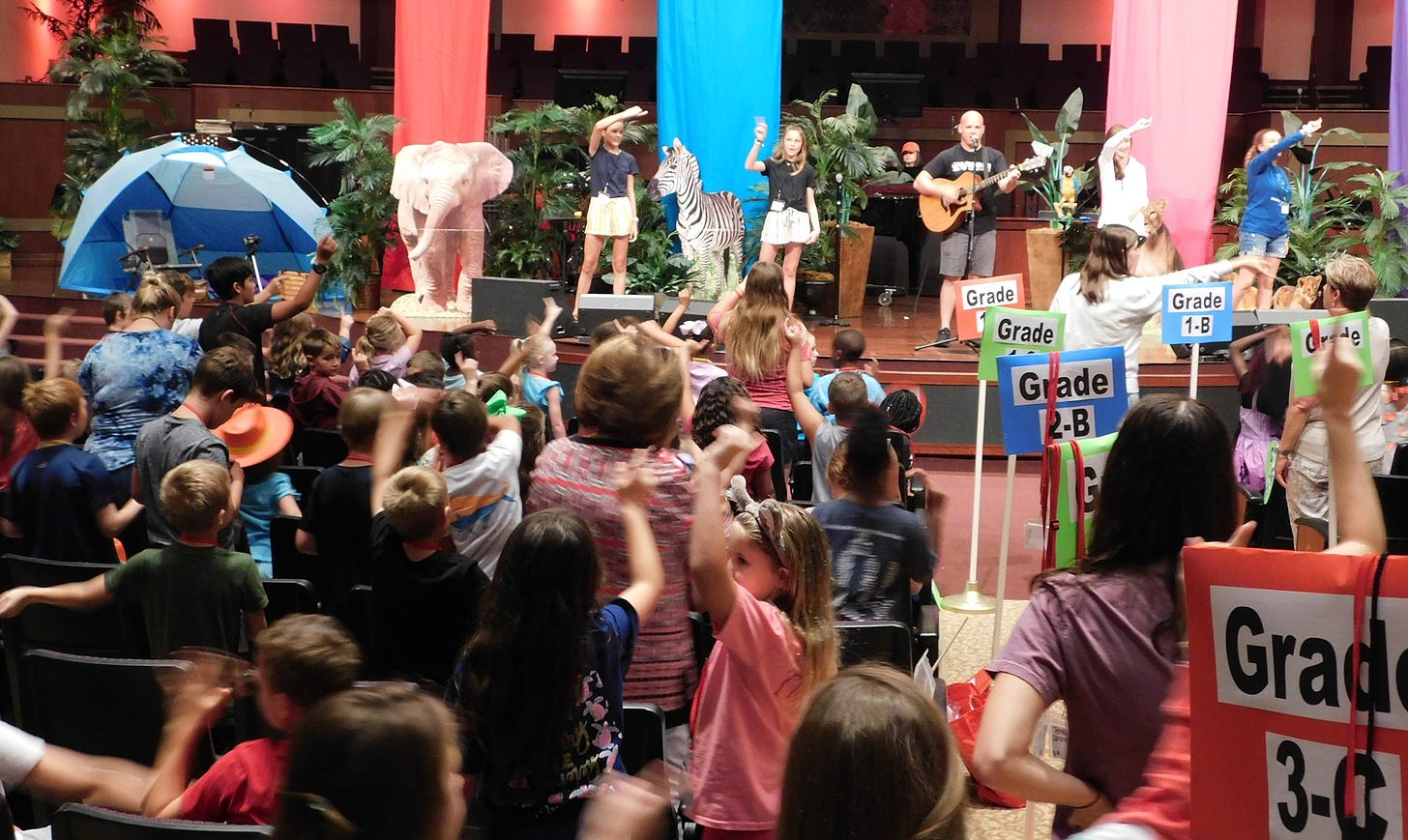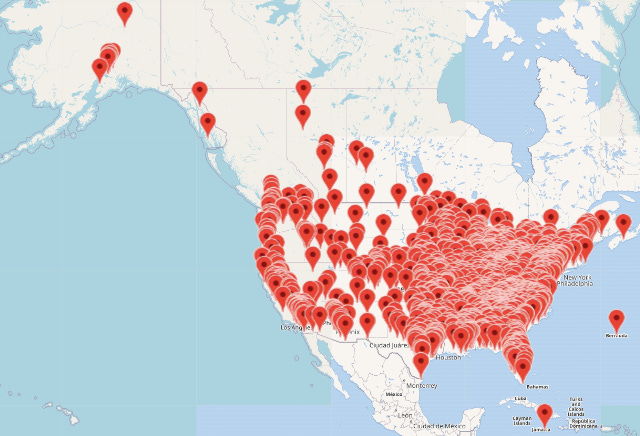Learning about Abortion at VBS
It’s Vacation Bible School time in a lot of churches. Kids will be learning biblical stories, memorizing verses, playing games with friends, acting out motions to songs, and enjoying delicious snacks — all in a safe space while parents get a bit of a break. And some kids this year will also learn about why abortion, euthanasia, and evolution are bad.
That’s right. The Zoomerang VBS from Answers in Genesis isn’t your parents’ VBS. This popular curriculum being used in hundreds of churches across the country sounds like a fun trip “down under” with cute Australian animals but actually packs a political punch.
“During this pro-life VBS, kids will discover that life is valuable … from the lives of preborn babies to eternal life,” the promotional materials promise about this “sanctity of life VBS.”
Ken Ham, founder of AiG, explained in a promotional video that this is “a very unique VBS.” And he’s not lying about that. He added, “This is really an important time to be able to train young people with the right foundation because of what’s happening in our culture with this issue” of abortion.
That AiG would create a VBS for the culture wars shouldn’t be too surprising. After all, the fundamentalist organization Ham leads has sought for decades to teach that God created the Earth in six literal days about 6,000 years ago. For Ham and AiG, these doctrines are non-negotiable for Christian faithfulness.
The group’s statement of faith required for employees also declares that “the Triune God” should be viewed “in the male gender with masculine pronouns,” that the Bible is “inerrant” in all areas like “its assertions in such fields as history and science,” that Noah’s flood explains “most fossiliferous sediments,” that “there is only one race of mankind — the human race or Adam’s race,” and that “the concepts of ‘social justice,’ ‘intersectionality,’ and ‘critical race theory’ as defined in modern terminology are anti-biblical and destructive to human flourishing.”

In 2016, AiG opened the Ark Encounter theme park in Kentucky that features a full-scale 510-foot-long replica of Noah’s Ark. It’s a controversial retelling of biblical accounts and is often criticized by scientists and theologians. And it cost over $100 million to construct, millions of which came from government bonds and tax incentives. Susan and William Trollinger, authors of Righting America at the Creation Museum, have visited the Ark Encounter and AiG’s Creation Museum multiple times to analyze the religious messages. They’ve written about how AiG offers fantastical explanations to justify its young Earth belief and preaches a wrathful God who killed, by AiG’s wild estimates, billions of people (and makes unsubstantiated claims about attendance at the Ark).
“It’s hard to imagine how children — or adults — can square AiG’s pro-life VBS with their notion of an extraordinarily angry God who drowned up to 20 billion people in Noah’s Flood (including millions of pregnant women),” William Trollinger (a Word&Way board member) told us.
Now, AiG is building a Tower of Babel replica (since the first tower went so well) to teach about “the racism issue.” But rather than just waiting for people to pair up and flock to the Ark, AiG creates curriculum for homeschool families and VBS. They recognize the importance of spreading their ideology to the next generation. As their leader guides for Zoomerang explain: “Researchers generally agree most people become Christians when they’re children, so it’s apparent this age group is a huge mission field!”
But for AiG, becoming a Christian means adopting specific fundamentalist doctrines on topics like creation, abortion, and racism. Do churches buying this curriculum realize what agenda they are facilitating? Do parents know this when they send their children to VBS at their church or the one down the street?
In this issue of A Public Witness, we sign up for a quick history of VBS before heading to Zoomerang to experience a unique VBS for today’s culture wars. Finally, we pack up for the day by reflecting on what this means for churches.
History of VBS
Exactly how VBS got started remains a bit of a mystery. Chris Gehrz, a historian at Bethel University, traced two different U.S. origin stories. One starts in Hopedale, Illinois, in 1894. That’s when D.G. Miles, the wife of a Methodist pastor, gathered children from various churches for summer sessions devoted to learning scripture. The second begins in New York City in 1898 when Eliza Hawes of the Baptist Church of the Epiphany launched an “Everyday Bible School” in a rented beer hall.
As Gehrz explained, it was another Baptist named Robert Boville who developed the idea into a movement. After running five New York-based summer schools in 1901, Boville became an evangelist for the concept and spurred churches in other cities to provide similar offerings. He went on to organize national and global campaigns promoting VBS.
In 1910, the Presbyterians became the first denomination to formally adopt the approach, and others soon followed suit. By the early 1920s, more than 5,000 programs existed in the United States. Lasting a significant portion of the summer, these schools mixed Bible lessons with activities, the development of practical skills, and even patriotic content. By mid-century, more than 5 million children in the U.S. attended VBS.
However, Gehrz cited a lament in The Christian Century among church leaders from that era about the typical program length shrinking from seven weeks to just two. Today, polling shows fewer churches offering programs, while curriculum is increasingly produced by parachurch organizations that cross traditional sectarian boundaries and downplay theological differences.

With lots of churches relying on only a few curriculum providers, this outsourcing of content development can create problems. In 2004, LifeWay Christian Resources (a ministry of the Southern Baptist Convention that serves many congregations both within and beyond the SBC) came under fire for its “Rickshaw Rally” curriculum whose theme and materials drew on offensive Asian caricatures. A decade later, LifeWay’s CEO acknowledged that “stereotypes were used in our materials, and I apologize for the pain they caused.”
A similar controversy engulfed Group Publishing in 2019. The provider of interdenominational resources released its “Roar!” VBS that garnered criticism for racial insensitivities in taking participants on an “epic” adventure to Africa. In addition to asking children to roleplay being Egyptian slaves (and teachers to act as angry guards), one activity involved mimicking African languages by making “clicking noises.”
Group Publishing apologized and revised the product following the blowback, but many churches had already purchased and promoted the theme. That left them scrambling to adapt the materials. For instance, leaders at New Covenant Church of God in North Charleston, South Carolina, rewrote the lessons and replaced the activity imitating slavery with a talk about “the cruelty of forced labor.” As Laura Elsey, the church’s preschool pastor, said, “At church, nobody should feel ashamed.”
Ham-Handed VBS
Much of Zoomerang is typical VBS flair with corny caricatures of the chosen exotic land where the week is set. In this case, Australia. So, kids get to enjoy “aus-some songs,” “koala-ty treats,” “hoppin’ good games,” and “turtle-y terrific science and crafts.” And the videos feature rough Australian accents as cartoons say “g’day, mate” and “grab your sunnies” (sunglasses). There are also decorating suggestions to make a eucalyptus forest or Great Barrier Reef.
While Australia offers plenty of material for bad puns, it doesn’t have an obvious connection to the “sanctity of life” theme any more than other places with abundant wildlife. But, like a clumsy kangaroo, the curriculum goes there anyways.
“Like a boomerang, we are returning kids to what the Bible says about the value of life!” a cartoon declares in one video just before a sonogram appears on screen.
Summaries of Bible verses provided in lessons inject conservative beliefs about life in the womb that don’t actually appear in the verses. Psalm 127:3 says that “children are a heritage from the Lord, offspring a reward from him.” But Zoomerang puts it: “Each child, from the moment of fertilization, is a blessing from God. God is the author of life. The lesson plans also go into detail, depending on the age group, about abortion and euthanasia numbers and laws in the U.S. and other countries.
One reason AiG argues churches should switch to their VBS is that their material “teaches apologetics so kids know what they believe and why.” That is, the emphasis is on learning and repeating talking points on contemporary issues, instead of a more expository focus on unpacking biblical stories. The VBS curriculum includes advice on sharing the gospel to those who have had abortions.
Day one looks at the “Creation of Man,” with the “apologetics focus” of “They can’t make a monkey out of me! (Ape-Man Frauds).” The next day, on the topic of “Fearfully and Wonderfully Made,” has the focus of “God thought of everything! (Design features of Our Bodies).” Day 3 recounts the story of King Herod killing baby boys after Jesus’s birth, with the focus “Be a defender of the defenseless! (Protecting and Respecting Life).” The memory verse that day doesn’t come from the passage but is instead the “golden rule.” As is common with VBS materials, day four is a salvation focus, with John 11:25 chosen since Jesus talks about being “the life.” The week wraps up with Jesus ascending and leaving his followers to keep doing the work: “Life Has Meaning and Purpose.”
Since AiG teaches a literal interpretation of creation week occurring just 6,000 years ago, that ideology shows up in the lessons. For instance, a teacher guide includes this “teaching tip” to share: “The ancestors of the Aboriginal people had migrated to Australia from the tower of Babel at some point during the past 4,300 years. The people at Babel had heard the truth about creation and the flood from Noah and his family. Over time, the true account changed into what is now part fact (man was created and didn’t evolve), and part fiction.” Scholars instead believe various groups of people included in the Aboriginal Australian category migrated there at various times between 11,500 and 50,000 years ago.
“As we explore the Genesis account that describes the creation of man and woman, we will find that people didn’t evolve from ape-men,” AiG added.
Elsewhere in the materials, AiG claims “Christianity is the oldest ‘religion’ dating back 6,000 years to the creation event described in the book of Genesis.” That inaccurate timing creates Christianity before Christ and ignores the Jewish faith of Jesus, the disciples, the prophets, and others.
As with many VBS programs, AiG’s guides offer suggested snacks, games, and crafts to connect with the stories. So, a treat for day one is a “Funky Monkey” face made of crackers, cheese, pretzels, cheerios, and chocolate chips to remind children: “Today, we’re talking about how we don’t share an ancestor with apes. … There’s no missing link between apes and man. People are people, and apes are apes.”
On day 3 — the day when they learn about Herod slaughtering babies — a game suggested for toddlers is to set up two baby pools with three Duplo figures per child floating individually on foam plates. The kids are then to “carefully carry a miniature person from one baby pool to another on their plate” and put it in the other pool. While it’s a race, they also have to be careful not to drop (and apparently kill) “the person.”
A suggested treat for that day is “Gingerbread Girls and Boys” to remind children that “God is the one who makes boys and girls like you! And you are very loved and valued by him” (so, now let’s eat these cute kids?). Another suggested treat for that day is even more likely to arise in therapy sessions years from now: “Baby in a Blanket,” which is a renamed “pigs in a blanket” that adds dots for eyes and a nose drawn on the little hot dog end sticking out. As one AiG video explained about the value of eating pretend babies: “This is a really great one for the kids to learn more about the value of life.”

Of course, no VBS is complete without decorations. In addition to various cheap trinkets and prizes to use during the week, churches can also buy posters to help set the mood. For Zoomerang, the posters include one that features a platypus, another with the Great Coral Reef, and a large one nearly 20-feet long and 6.5-feet tall showing the developmental stages of a baby in a womb.
The lessons also get into sexual anatomy, especially for youth. After watching a 55-minute video on day two about human “development from embryo to birth,” teachers are suggested to ask a few questions to students, including, “How does a female ovary testify to our intelligent creator?”
Rise of Political VBS?
Having trusted a local church to teach their child about the Bible, how many parents or grandparents will end up surprised (outraged?) when their children come home talking about abortion and evolution? As former church pastors, those are phone calls and emails we’re happy to not receive.
To be clear, we’re not saying churches shouldn’t talk about controversial topics. We’d actually prefer more conversations about political and ethical issues in our churches, as Christians need to consider such subjects through the lens of their faith rather than the partisan spin of cable news. But kids’ VBS is not the appropriate forum for such weighty discussions about the relationship between faith and science or the moral complexity of abortion. Nor do we regard Answers in Genesis as a trusted teacher.
Indeed, from our review of the Zoomerang materials, we see a different agenda at play. Instead of helping children understand the Bible, the Zoomerang curriculum is designed to indoctrinate participants in support of ideological causes. Rather than fostering an appreciation of scripture and what it reveals about God, Zoomerang is designed to cultivate and nurture the next generation of culture warriors. Standing on the cusp of a watershed victory on abortion, reaching the captive audience of children in churches during summers helps ensure the sustainability of present and future gains.

Whatever success this creates in the political realm, it is almost certain to inflict harm on Christ’s Church. Polling last year revealed that Christians perceived overt partisanship in congregations as damaging to the church’s witness and reducing their desire to participate in church life. Conforming to the political polarizations of society ends up poisoning Christian communities, with a congregation’s witness idolatrously reduced to a partisan agenda. Many inside the sanctuary choose to leave and many on the outside decide never to enter. Gains in the world come at a cost to the soul.
From political sermons to campaign rallies in worship services to sanctuaries used for partisan revivals, American Christianity faces constant pressure to sacrifice its religious convictions on partisan altars. Ideologically-driven VBS curriculum is only the latest evidence that politics is our nation’s true religion. This year kids face inculcation about abortion and evolution. Next year they may be inundated with lessons against CRT or helping refugees. What they’re not learning about in Vacation Bible School, ironically, is the Bible.
At Zoomerang VBS this summer, children will hear various claims that contradict what scientists, historians, and theologians teach. More than mere disinformation, it risks preventing them from learning how to follow Jesus more faithfully. For instance, AiG’s lessons for Zoomerang blame Charles Darwin and evolution for the “mistreatment of the Aboriginal people” in Australia. To teach this, the material suggests to teachers, “You may want to show a picture of Aboriginal people in chains.”
But the mistreatment actually predated Darwin and instead often came from Christians. That’s why the Catholic Church in Australia publicly apologized in 1996 for its role in the forced removal of Aboriginal children that “will remain forever a blight on our nation.”
“There was an underlying view that conversion to Christianity required the weakening of the spiritual influence of Aboriginal elders and culture on the younger generation,” the Church’s statement explained. “This led almost inevitably to accepting the idea that the physical separation of Aboriginal children from those families who were not in reserves or missions was necessary for their ultimate spiritual and material well-being.”
If we don’t learn the lessons of history right, we’re more likely to repeat them with the self-righteous arrogance of fundamentalism. It’s another example of why churches and parents should not trust Ken Ham or Answers in Genesis to teach their children.
And when it comes to thinking about the spiritual well-being of children, perhaps we shouldn’t tell them about Herod killing the babies right before serving them a “Baby in a Blanket.”
As a public witness,
Brian Kaylor & Beau Underwood




